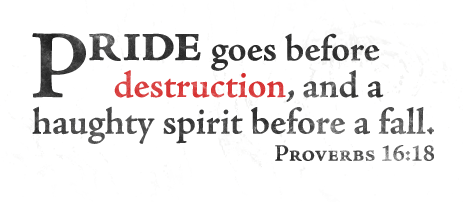Perhaps previous generations were too severe, thinking children should be ‘seen and not heard’, and many a young sensitive soul got crushed. Growing hearts and minds need some encouragement to dream, strive and achieve!
So then we have pride.
Is this a good or a bad thing?
We can’t help but notice there’s a lot of it about these days. Indeed people are positively encouraged to ‘be proud’.
It’s natural for those of us who are parents to show our delight when our family do well in something. It feels good to do something worthy of note. We are grateful when someone honours or commends us with encouraging words. These are fine but a cautionary bell from older generations may still sound in the back of our minds, calling out ‘Pride comes before a fall!’ Turns out this famous, if unfashionable, saying actually originates in the Bible!
More than ever it seems we human beings like to tell ourselves how wonderful we are, to glory in all we have achieved. Yet experience soon shows how easily any of us can trip, tumble, crash and find ourselves ruined and embarrassed.
I was just remembering a couple of Bible passages that suggest the original sin was not committed by Adam and Eve in the Garden of Eden but by Satan, once an angel in heaven!
Old Testament prophet Ezekiel in chapter 20 of his book warns a human ruler, the King of Tyre of an impending fall from power and cites the example of the ‘expelled…guardian cherub (angel)’ driven ‘in disgrace from the mount of God’. To Satan the Lord says, ‘Your heart became proud on account of your beauty, and you corrupted your wisdom because of your splendour. So I threw you to the earth…’ (v17)
New Testament Apostle John echoes this in Revelation 12v7-9: ‘There was war in heaven. Michael and his angels fought against the dragon, and the dragon and his angels fought back. But he was not strong enough, and they lost their place in heaven. The great dragon was hurled down – that ancient serpent called the devil or Satan, who leads the world astray. He was hurled to the earth, and his angels with him.’
Instead of giving thanks and honour to God the Creator and Giver of all good gifts, the devil wanted selfish glory for himself, proudly sought his own advancement and suffered a humiliating ‘fall’ as a result!
So we might say the original sin was not disobediently eating forbidden fruit but harbouring the kind of pride that refuses to give God His rightful place.
By contrast read Psalm 149, a song of jubilant celebration in which believers rejoice in God as our ‘Maker’ and ‘King’. It is clearly not proud people but humble folk who receive blessing from God.
‘The Lord takes delight in His people; He crowns the humble with salvation.’ (V4)
Humility does not mean putting ourselves down needlessly or imagining we have no worth. Rather it is an honest realism that recognises human beings as fallible and flawed, yet rejoices that we are created, loved and rescued by God through Christ. As such we celebrate the talents and abilities He gives and give the thanks and glory where it belongs – to Him!
This Psalm suggests that praising God, prayerfully trusting Him and living to glorify His name is actually a powerful influence to bind evil and promote good in the world.
So it appears we have a choice, pride in ourselves or praise of our Lord. One leads to fall and shame, the other to salvation and joy.
Let’s give the last word to the Apostle Peter:
‘‘God opposes the proud but gives grace to the humble.’ Humble yourselves, therefore, under God’s mighty hand, that He may lift you up in due time.’ (1 Peter 5v5-6)

 RSS Feed
RSS Feed